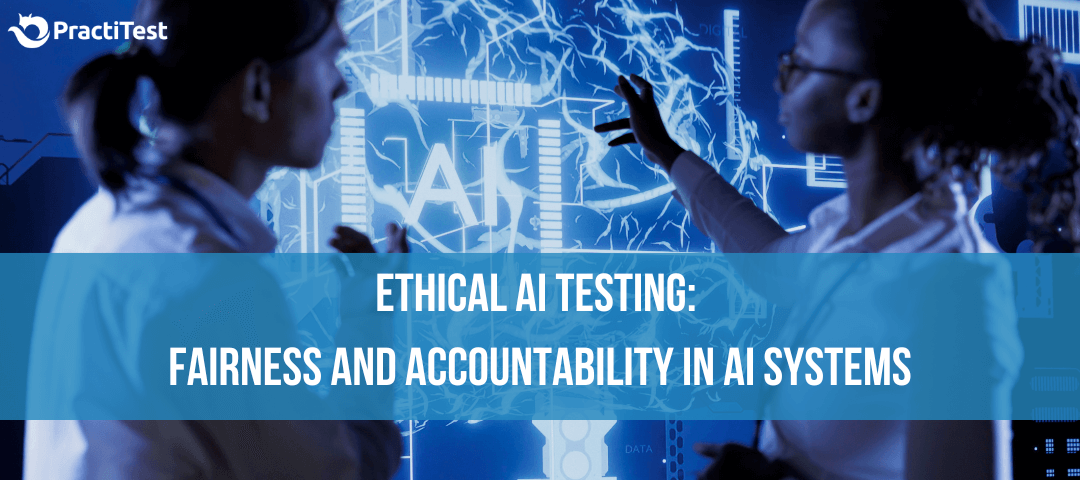Ethical AI Testing: Fairness and Accountability in AI Systems
In This blog
Ethical AI Testing: Ensuring Fairness, Transparency, and Accountability in AI Systems
Walking in the shoes of a software developer, how often do you think about the ethical use of AI in software testing? While AI has significantly streamlined operations, it isn’t free from flaws. With a plethora of AI tools flooding the business landscape, it’s imperative to ensure that such software is tested ethically before deployment.
It’s easy to overlook the concerns over the unethical use of AI, particularly in the light of data privacy. A survey reveals that 86% of respondents believe that the government should regulate AI companies. Around 55% of the respondents stated that AI developers often overlook ethics while developing these tools.
So, whether you are part of a DevOps team or happen to be a part of an AI QA testing team, AI writing assistant team, upholding ethics is crucial. In this guide, we’ll explore the best practices for testing AI, as well as deploying artificial intelligence for software testing.

What Is Ethical AI Development?
As the name suggests, ethical AI development involves building intelligent systems that comply with moral, legal, and ethical standards. AI is a technology, which performs whatever it is programmed for. This explains why software developers need to program such tools while considering ethical standards.
Now, developers encounter certain hurdles while configuring AI tools, prioritizing morale and ethics.
AI tools are used globally, but there’s no standard set of parameters defining what is ethical and what isn’t. However, researchers and developers have tried to define some ethics that they incorporate while building AI tools.
The second hurdle lies in the choice of ethical framework. Prescriptive ethics is a field that establishes a set of norms and guidelines that determine ethical behavior. Developers also need to adhere to descriptive ethics that prescribes a set of ethical judgments for particular situations and cases.
What Are The Challenges Of Ensuring Ethical AI?
Software developers encounter several challenges while developing responsible and trustworthy AI systems. Here are five key challenges in ensuring ethical AI.
Algorithmic Bias and Fairness
AI algorithms can unintentionally work on biases present in training data. This often leads to unfair outcomes for certain groups. For Ethical AI developers, it’s imperative to ensure fairness and mitigate bias at different stages of developing AI. From deploying the model to collecting data, developers should exercise caution.
Transparency
Often, AI systems operate as “black boxes”, making it challenging to understand how they decide on something. It’s essential to ensure transparency and explainability in AI processes to foster trust among stakeholders and users. This ensures accountability as AI systems leave a significant impact on society and individuals.
Data Privacy
With information overflowing in the digital age, AI systems remain heavily reliant on data. This raises significant concerns over breaches of privacy and unauthorized access to information. Therefore, the need of the hour is to secure sensitive data and deploy robust security measures, so that AI tools aren’t misused.
Accountability and Liability
As a software developer, you’d acknowledge the challenge in determining liability and accountability for AI-related actions or decisions. This is particularly true in cases of AI failures. One of the critical challenges in ethical AI testing lies in clarifying legal and ethical frameworks to ensure responsibility.
Ethical Decision-Making
For AI systems, it’s easy to run into ethical dilemmas when it comes to prioritizing competing values or making decisions with uncertain outcomes. This justifies the urgency to develop guidelines and frameworks for ethical decision-making in AI. This includes considering human rights along with societal values.
AI developers, policymakers, and researchers need to coordinate and address these challenges. A proactive approach to tackling the hurdles will foster responsible development and incorporation of AI technologies.
Ethical Considerations While Using AI In Software Testing
Have you considered the ethical aspects of using AI in software testing before their final deployment? T he process of software testing, backed by AI, significantly enhances efficiency and accuracy while developers deal with complex scenarios. With the inception of AI, forward-thinking developers have embraced the technological leap, introducing significant ethical challenges. Particularly, data misuse and the lack of transparency in AI algorithms continue to bother software developers. In order to foster responsible innovation in the field of AI, it’s crucial to understand these issues.
The Role of AI In Software Testing
The role of AI in testing software marks a major change in the contemporary approach to quality assurance. Thanks to AI and machine learning, advanced tools are capable of evaluating extensive sets of data and predicting their outcomes with accuracy. This makes the software testing process more comprehensive. This also leads to ethical concerns like accountability, algorithmic bias, and data privacy.
New Challenges to Ensure Fairness In Software Testing
Have a look at the fresh challenges that software developers encounter while ensuring fairness in software testing.
Accountability for Testing Outcomes
With AI becoming the new standard in software testing, a key challenge lies in ensuring accountability for testing outcomes. Developers should consider aspects like who should be responsible in case AI fails to detect critical software flaws or falters while making decisions during testing.
With a clear framework to define accountability in place, developers can uphold ethical standards and address potential consequences during software testing.
Fairness across Diverse Test Cases
Fairness in software testing also encompasses ensuring equitable treatment across diverse test cases and user scenarios. AI-oriented testing systems should be designed to avoid favoritism or discrimination based on demographics, geographic location, or configurations.
To achieve fairness, developers need to continuously monitor testing algorithms and adjust the same to do away with biases. This goes a long way in making testing practices inclusive.
Ethical Decision-Making while Testing
Within AI-driven software testing, ethical considerations extend beyond decision-making processes. Developers and software testers often find themselves in ethical dilemmas when it comes to prioritizing objectives during software testing and handling sensitive data. Developers must uphold ethical standards in AI-driven software testing to promote fairness, coming up with adequate ethical guidelines and frameworks for decision-making.
Tips to Ensure Ethical AI Testing All Developers Should Follow
Now that you are familiar with the prime challenges of AI-driven testing, let’s explore the recommended guidelines to ensure ethical standards.
Ensuring Fairness during Data Collection and Handling
Forward-thinking developers are already implementing robust data collection practices to ensure fairness in AI systems. This process involves collecting information from different sources and creating representative datasets.
For instance, if you are developing an AI system for loan approvals, make sure that the training data includes a wide range of applicants based on parameters like age, gender, race, income level, and geographic location. This can be done by using customer survey tools that let you create real-time reports and send them on different channels be it offline or online.
Several well-established eCommerce platforms, including Ubuy, are committed to implementing best practices in the handling of customer data.Moreover, other companies outside the virtual retail sphere have also demonstrated effective approaches to data management, serving as examples of responsible data stewardship.
Addressing Biases
Sophisticated techniques like data augmentation and stratified sampling can address issues like biases and imbalances in training data. Data augmentation involves modifying existing data to create a more balanced and inclusive dataset. Stratified sampling, on the other hand, ensures that each subgroup within the dataset is represented proportionally. This does away with the risk of underrepresentation or overrepresentation of certain groups.
Data Audits and Updates
Experts recommend conducting data audits and updates regularly to identify potential biases, errors, or inconsistencies. This involves evaluating the quality of data, checking for missing values, and evaluating whether each group has been represented consistently within the dataset.
Also, developers and QA experts need to update their datasets periodically. This way, changes in demographics and other preferences will be reflected in the outcome, leading to fairness in the AI system.
Detecting and mitigating bias
Software testers need to implement bias detection and mitigation techniques during the model training period. The process involves using algorithms and tools to identify potential biases in model outputs and datasets.
For instance, developers should use fairness-aware machine learning algorithms capable of adjusting predictions to minimize disparate impact across demographic groups. This would maintain the necessary performance metrics at the same time.
Transparency in Data Sources
It’s essential to maintain transparency in the sources of data and processing methods to ensure trust and accountability. Developers should know the origin of data sources, data collection procedures, and data pre-processing techniques. Stakeholders should have access to relevant information on how the data was collected, curated, and labeled to ensure transparency. This approach also facilitates ethical decision-making.
Transparency in Algorithm Design and Operation
Here are some recommended processes to ensure transparency in algorithm design and operation.
Documenting Algorithms and Models
For developers, it’s essential to document and explain the underlying algorithms and models used in AI systems to promote transparency. Therefore, they should provide detailed documentation describing the architecture, decision-making processes, and parameters of the AI algorithms. This documentation should be accessible to developers, users, regulators, and auditors.
Explainable AI (XAI) Techniques
As a developer, you must understand the value of implementing Explainable AI (XAI) techniques in enhancing the transparency and interpretability of AI systems. There are various XAI methods like feature importance analysis, model visualization, and decision tree explanations. These help users understand how AI models predict and make their decisions. AI systems gain more transparency, where users can trust and validate the reasoning behind AI-driven outcomes.
Use Transparency Tools and Dashboards
It’s time to develop dedicated tools and dashboards to maintain transparency, providing relevant information on AI system operations. Such tools can include performance metrics, accuracy rates, and bias assessment summaries of data storage. Transparent dashboards allow you to monitor AI system behavior, identify potential issues, and track compliance with ethical guidelines.
How to Establish Accountability Frameworks?
Here’s how developers and QA professionals can establish robust accountability frameworks for AI systems.
Clear Roles and Responsibilities
It’s imperative to establish clear roles and responsibilities for everyone involved in the AI development process, right from conceptualization to deployment and monitoring. Thus, software development companies should define the roles of data scientists, developers, project managers, compliance officers, and executives. This will ensure responsible and ethical AI practices.
Ethical Impact Assessments
Software developers must conduct Ethical Impact Assessments (EIA) to evaluate potential risks and biases of AI systems. EIA helps in identifying ethical challenges and helps developers make informed decisions while developing AI. In this regard, it’s crucial to consider the ethical implications of AI algorithms on privacy, fairness, and transparency.
Transparency Reports
Established software developers should publish transparency reports from time to time, detailing the operations of their AI systems. These reports should include details on data usage practices, performance metrics, and operations. With regular audits and assessments, QA experts can evaluate the transparency and fairness in AI systems.
Wrapping Up
With competition raging in the software development industry, it’s imperative to ensure accountability and trust in AI systems. Now that you are better poised to tackle the ongoing challenges, adopt robust practices for data collection and maintain transparency in designing algorithms. This way, you can address ethical challenges and minimize biases to uphold ethical standards throughout the software lifecycle.
























